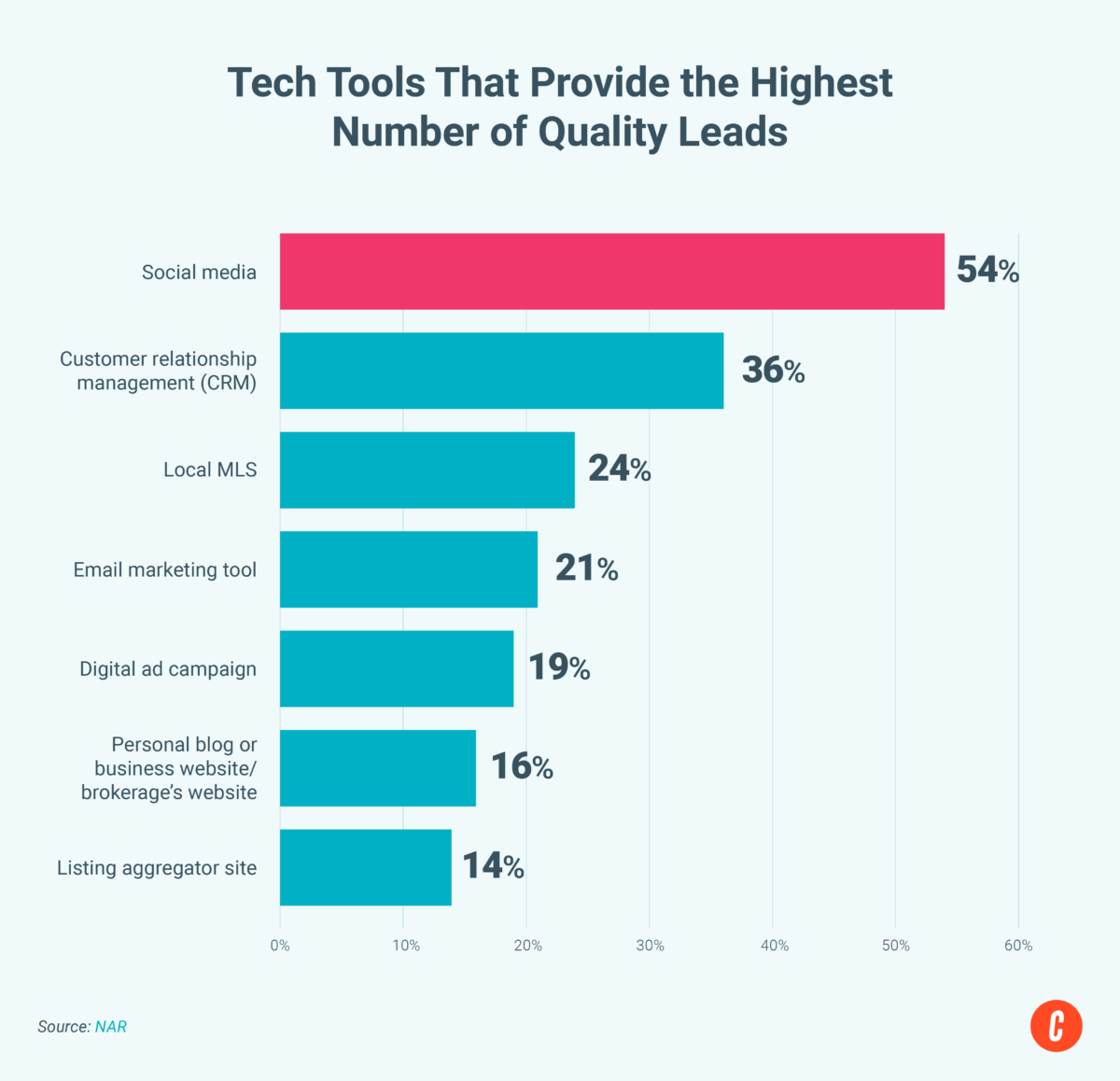November 11, 2024
 by Izabelle Hundrev / November 11, 2024
by Izabelle Hundrev / November 11, 2024

For aspiring real estate agents, lead generation should be a primary focus.
Attracting new clients is a crucial ongoing process that not only kickstarts your career but also sustains it over time.
As agents establish themselves, they often become well-known within their communities, creating a steady stream of buyers and sellers eager to seek their expertise. Until you reach that level of recognition, it’s essential to proactively explore innovative strategies to promote your services and generate interest.
To help you get started, we’ve identified the top 7 effective strategies for generating qualified real estate leads. Your target audience may respond positively to certain methods while showing less interest in others. Using a real estate CRM can help you analyze these outcomes.
As you implement these strategies, track your results to identify what works and what doesn’t. The best part? You don’t need a hefty marketing budget to grow your client base. Let’s dive in!
Social media allows you to connect with potential buyers and sellers in a more authentic and personal way.
Building a social media following doesn’t happen overnight, it will take time to perfect your real estate social media strategy.
But one thing is for sure: If you want to see real results, it will take a lot more effort than sharing a few statuses here and there. You will need to aim to be active on multiple channels and post various types of content consistently.

Source: The Close
Below, we’ll break down how to make the most of each popular social media platform to generate real estate leads.
Your first step should be to create an Instagram business profile. This allows you to have an account dedicated entirely to your real estate business and access Instagram analytics that will help you track your profile's performance. Be sure to have your website and contact information linked in your bio, making it easy for potential clients to reach you.
Create content that highlights your personality, work ethic, current listings, and events you might be hosting, such as an open house. You should aim to come off as professional, approachable, and authentic. Before you know it, you’ll start to see your profile picking up steam and generating leads.
Tip: Instagram is free to use, but you can also pay for ads. Learn to advertise on Instagram to reach your audience more effectively.
Facebook and Instagram go hand-in-hand. Since the social media giant bought Instagram in 2012, the two platforms have become seamlessly integrated to improve user experience. All business accounts on Instagram are connected to Facebook. This allows you to track analytics across both platforms and ensure your brand language is cohesive.
On your Facebook page, be sure to add a profile picture, cover photo, and bio. As always, you want to make it as simple as possible for potential clients to reach you, so be sure to link to your website and add contact information. When it comes to sharing content, be sure to post regularly and engage with users who are leaving comments.
Don’t be afraid to share personal updates from time to time. It may be true that you’re running a business, but you also want to come across as relatable and trustworthy.
Creating a Facebook business profile is free, but there are paid features. If you’re considering investing money into the platform, first check out these tips for creating impactful real estate Facebook ads.
Your professional network can be just as powerful as your personal one. LinkedIn may not be top of mind when it comes to lead generation, but the platform shouldn’t be overlooked.
Make sure your profile is up-to-date and on-brand. Join groups to connect with other real estate agents who have similar interests and continue to build your network - you never know, they could have potential referrals in your area. Promote content from your website or post original written pieces to establish yourself as a thought leader.
Similar to the other platforms mentioned, LinkedIn is free to use but also offers paid ad offerings.
Twitter is useful for promoting existing content in small, digestible snippets. Anytime you write a new blog or share a big update, be sure to post about it on Twitter using relevant hashtags.
Additionally, the platform is very conversational, which leaves a window of opportunity for directly engaging with potential leads. Using the search feature, you can see what people in your community are tweeting about in real time (including your competition). Don’t be afraid to join the conversation.
As with any social media platform, your Twitter profile should be fully up-to-date and branded to match your existing online presence. For information on further leveraging your page and paid options, check out our in-depth guide to Twitter marketing.
Tip: If you feel you’ve spread yourself too thin, consider investing in social media marketing software to manage all your profiles and analytics.
Begin by collecting essential details about your property, such as its size, number of bedrooms and bathrooms, amenities, and unique features. Next, conduct research on similar properties in your area to establish a competitive rental price. After that, capture high-quality photos of both the interior and exterior to showcase your property's best features.
In the U.S., popular platforms like Zillow, Trulia, and Realtor.com are effective for listing rental properties, providing access to a wide audience of potential tenants. You can also join local Facebook groups to share your property photos and connect directly with community members actively seeking rentals.
Additionally, Facebook Marketplace offers a free and straightforward way to advertise your property, allowing you to reach interested renters quickly. Its user-friendly interface facilitates direct messaging, enabling faster communication and engagement with potential tenants.
One of the easiest ways to get your name out there is to step outside your office and engage with your local community. This effort extends beyond merely attending a few networking events; it involves building genuine in-person relationships with people in your area, which is crucial for promoting yourself.
Consider hosting an open house, volunteering at a local non-profit, or attending community seminars to connect with new people. Additionally, participating in local expos or trade shows can significantly enhance your visibility. These events provide an excellent platform to showcase your property listings, network with other professionals, and meet potential clients face-to-face.
Strive to become a familiar face in your social circles, and don’t hesitate to share your business card when the moment feels right. You never know who might be looking for a new home or seeking your services!
Having a database won’t necessarily bring new leads in, but it will help you more effectively manage the contacts and relationships you already have.
Your marketing efforts could be generating tons of new leads, but if you can’t keep them organized and ensure a timely follow-up, then it’s possible they won’t convert to clients. Failure to stay organized can cost you a lot in terms of potential commission.
If you’re just starting out, using a spreadsheet is an easy and cost-effective way to keep track of lead activity, listings, and deal progression. Your business should live on this spreadsheet, which should be updated in real-time or at least daily as new business comes in and out.
As your lead generation efforts ramp up, it may become increasingly difficult to keep track of your contacts manually. If that’s the case, consider investing in real estate CRM software, which will give you plenty of time back in your day.
In real estate, trust is the name of the game. Buying or selling a property is a big financial decision with potential long-term consequences. People want to know they can trust their real estate agent to serve their best interests and help them make the right choice.
One of the first places people turn for a trusted opinion is their friends and family.
home buyers discovered their agent through a referral from a friend or family member.
Source: Save My Leads
That’s a big chunk of overall business that can be influenced just through word-of-mouth marketing.
You don’t have complete control over what people are saying about you, but you can leverage your happiest clients to be your greatest advocates. Don’t be afraid to ask for client testimonials and use them in your marketing materials as a form of social proof.
Tip: Take a proactive approach to referrals. If you've just helped them close on a property, instead of waiting for your clients to refer you, just ask them to share your services with their friends and family. A simple request can go a long way in expanding your network!
For real estate agents, direct mail is one of the most cost-effective options for generating leads.
The key to success in direct mail marketing is targeting and authenticity. You don’t want to be overtly sales-y, as that’s an easy way to get your mail tossed in the trash instantly.
Plan targeted campaigns that present the recipient with immediate value. The same message won’t work for every audience, so tweak your value proposition accordingly.
For example, people living in a luxury, gated community likely won’t care about a listing in a lower-end neighborhood on the other side of town.
Although achieving at scale is impossible, send highly personalized, handwritten notes when you can. A good rule of thumb is to follow up with a handwritten note for any in-person interaction you have with a potential client, such as after an interview or following an open house. Personalization can be the difference between a client picking you over another real estate agent.
Start by building an email list of potential buyers, sellers, and investors through lead magnets like downloadable guides or market reports. Segment your audience based on their specific needs, such as first-time buyers or sellers looking to downsize, to deliver personalized and relevant content.
To enhance your email marketing campaigns, invest in a skilled graphic designer who can create captivating visuals that draw attention and convey your brand's message effectively. Engaging visuals can significantly improve click-through rates and overall engagement, making your emails more appealing and impactful.
Craft compelling emails with information about local market trends, property listings, and valuable home-buying tips. Consistently follow up with targeted offers, such as scheduling property viewings or consultations, while tracking engagement metrics to refine your strategy over time. Combining strong content with eye-catching visuals allows you to create a powerful marketing approach that resonates with your audience.
Remember that you can’t manage what you can’t measure. Keep close tabs on all of your lead generation efforts and track their performance. A lead is only valuable if it turns into a client, so be sure to nurture your relationships and provide stellar real estate services to give them a reason to come back to you in the future.
Explore the best lead intelligence software, thoroughly tested and reviewed by our team to help you grow your real estate business.
This article was originally published in 2019. It has been updated with new information.
Izabelle is a Partner Marketing Specialist at InStride and a former content specialist at G2. Outside of work, she is passionate about all things pop culture, food, and travel. (she/her/hers)
Identifying and implementing effective lead-generation strategies makes all the difference in...
 by Eric Quanstrom
by Eric Quanstrom
If you work in marketing, chances are you’ve heard these terms used interchangeably.
 by Alexa Drake
by Alexa Drake
Generating leads isn’t just a priority for small businesses and startups anymore. Corporations...
 by Mehdi Hussen
by Mehdi Hussen
Identifying and implementing effective lead-generation strategies makes all the difference in...
 by Eric Quanstrom
by Eric Quanstrom
If you work in marketing, chances are you’ve heard these terms used interchangeably.
 by Alexa Drake
by Alexa Drake


